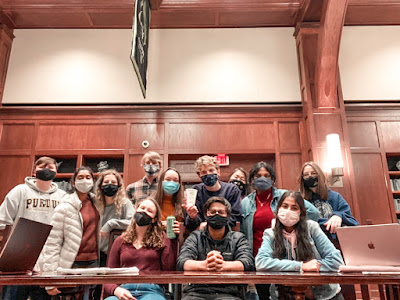Learning Communities at Purdue
Coming to campus may seem daunting, after all the university has a very large student body and the campus itself is expansive, however one way to make the campus seem smaller is by joining a learning community. You may have been introduced to learning communities through tours at Purdue, your own research, or online seminars about Purdue. Through learning communities, you live with other people who have the same interests as you and participate in small classes with these students. Continue reading to learn more about two possible communities you could join, and to hear about some students’ experiences within each one.
EPICS - Tanvi
The Engineering Projects in Community Service-learning community is a project-based that focuses on designing engineering-based solutions to address the local community’s most pressing needs. I was in the EPICS learning community for both semesters of my freshmen year. When you are in a learning community you are mostly placed in the same dorm. For me, this was a great way to meet people in my major. EPICS learning community currently resides in Shreve Hall. You also get to take some classes that are specific to the learning community. Instead of taking ENGR 131 and 132, you just take ENGR 133 for one semester which saves a lot of time! EPICS has a wide range of teams from which you can choose. It gives you a taste of how the industry works and prepares you for various professional practices including communication and presentation skills. You also get hands-on experience by working on real-world projects while making an impact on the community. EPICS is also just a one-credit class so time management should not be a problem. Personally, the part that made the experience so much better for me was the team I had. That is also where I met my best friend now for the first time. The professors and advisors were so knowledgeable and helpful. While I was on the PHARM EPICS team, I also got to learn how to use some cool tools such as a rotary drill saw, a corded circular saw, etc. Overall, one hundred percent recommend engineering students to be a part of this committee if you want to get formal mentoring and some amazing projects to add to your resume.
Global Engineering - Lily
Global Engineering is a learning community that aims to give students the tools and understanding necessary to work in an increasingly global workspace. In your first semester, you take ENGR 13100 which is the first class for all engineers - in a learning community or not - that teach you Excel and data analysis skills. You are also in a class specifically for engineers in your learning community - ENGR 13001. This class is entitled, “Innovations for the Global Grand Engineering Challenges” and is a seminar class in which you listen to engineers from a variety of disciplines explain their global work. The class is a great way to hear from different engineers and learn more about what discipline you may want to join, if you are undecided. In your second semester, you have the option to take a research and design class focused on creating solutions for real-life problems in the scope of the Global Engineering Challenges. You also have the option to live with other members in your community in Shreve Hall, though you don’t have to live in the building if you want to participate in another learning community (which is an option for students interested in multiple communities).
In my experience, I enjoyed the seminar aspect of the class. It was a great way to hear about interesting engineering projects and how engineering can link to a variety of jobs - such as entrepreneurship, non-government organization (NGO) work, and higher positions within a company such as CEO or regional managers. I didn’t live with the members in my learning community as I was living with my other learning community, Women in Engineering, in the Meredith South hall. If you are interested in the Women in Engineering Learning community, here is a link to a blog post on that learning community by someone who participated in it. I did not take the research class in my second semester but I still found the first semester class to be interesting and informed what my future career goals were. I would recommend the class to any and all students interested in finding a community of students interested in global relations and its connection to engineering.
There are so many ways to get involved and meet new people on Purdue’s campus, and living learning communities are a great example of that. With so many options, you can really tailor your time at Purdue just the way you want it. If you have further questions about living learning communities reach out to welink@purdue.edu
Stay Connected With Purdue WIEP!
Facebook: Purdue Women in Engineering
Twitter: @purduewiep
Instagram: @purduewiep
Blog: purduewiep.blogspot.com
Email: welink@purdue.edu
Tweets by PurdueWIEP




Comments
Post a Comment